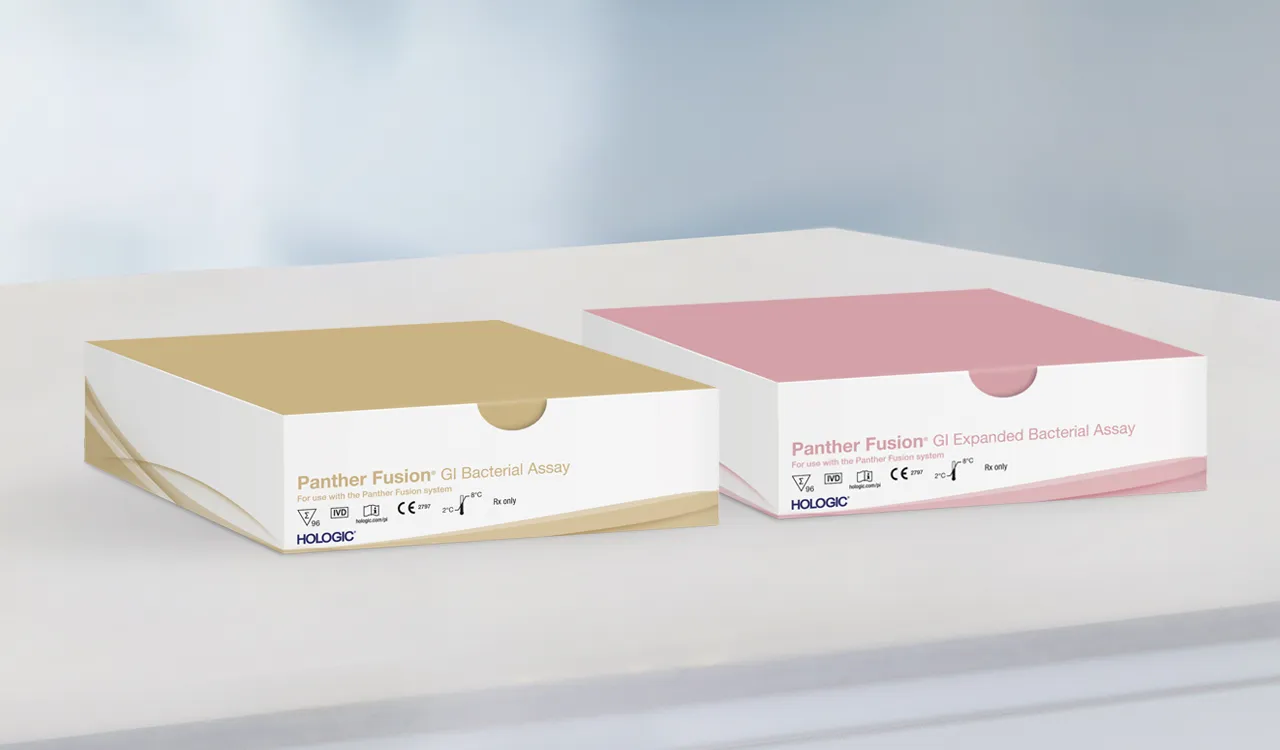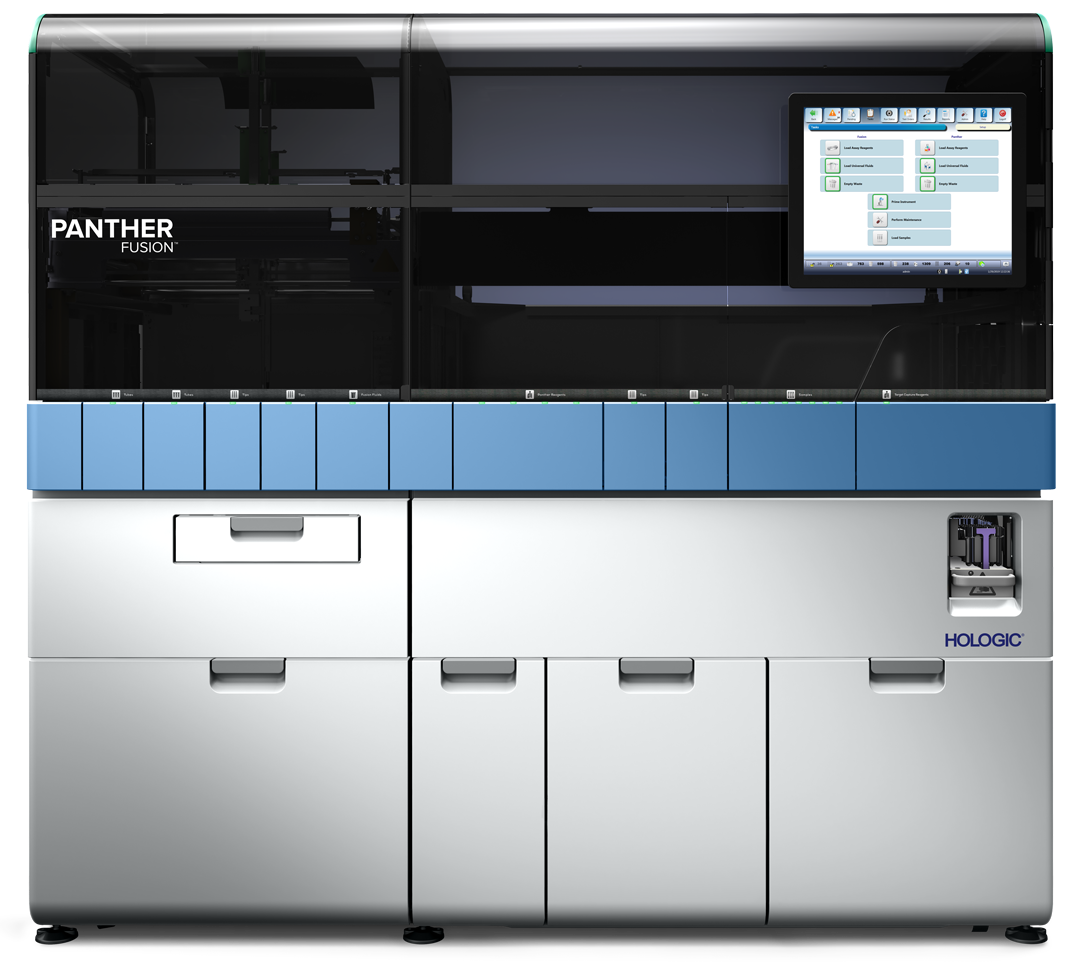Hologic Receives FDA Clearance and CE Mark for Automated Molecular Tests to Detect Common Causes of Infectious Gastroenteritis
October 2, 2025
New Panther Fusion Gastrointestinal Bacterial and Expanded Bacterial Assays deliver tailored, actionable diagnostic results to support fast and informed patient care
MARLBOROUGH, Mass., October 2, 2025 – Hologic, Inc. (Nasdaq: HOLX) announced today that the U.S. Food and Drug Administration (FDA) has granted 510(k) clearance for the Panther Fusion® Gastrointestinal (GI) Bacterial and Expanded Bacterial Assays. The company also announced that the assays obtained CE marking in the European Union in accordance with In Vitro Diagnostic Regulation (IVDR). These highly sensitive molecular tests are designed to rapidly detect the most common bacterial pathogens responsible for infectious gastroenteritis.

Infectious gastroenteritis, an inflammation of the GI tract caused by bacteria, viruses or parasites, can range from mild to life threatening. In the United States alone, it is estimated that nearly 200 million cases occur annually, including up to 3 million that require ambulatory visits.1 Across Europe, foodborne outbreaks have resulted in the highest numbers of related hospitalizations and deaths recorded in a decade, with Salmonella accounting for the largest proportion of cases.2, 3
A variety of complex factors, including climate change, agricultural practices, antibiotic use and their respective impacts on the environment and food safety may be contributing to the prevalence of diarrheal disease around the world.3, 4
“At Hologic, we recognize that access to a comprehensive range of accurate and fully automated diagnostic tests is essential for laboratories and their patients,” said Jennifer Schneiders, Ph.D., President, Diagnostic Solutions at Hologic. “FDA clearance and CE marking of our first GI pathogen detection tests reflect our dedication to advancing diagnostic innovation, and equipping laboratories and clinicians globally with the tools they need to provide fast and informed care when time matters most.”
Traditionally, identifying pathogens causing severe diarrheal illness required the combination of culture, biochemical and microscopy-based tests, which can be labor-intensive, time-consuming and less sensitive than molecular methods. Hologic’s new GI pathogen detection tests leverage rapid molecular technology and cover common bacterial causes of infectious gastroenteritis, including Salmonella, Campylobacter, Shigella, E. coli (including O157), Vibrio, Yersinia and Plesiomonas, and can be run together or in any combination. In this customizable mini-panel format, the new assays allow testing to be specific and tailored to individual patients’ needs. This approach also helps reduce testing, streamline lab processes and accelerate time to diagnosis and clinical management. In the long term, it supports antimicrobial stewardship by enabling judicious antibiotic use only when clinically necessary.5

Testing of the Panther Fusion GI Bacterial and Expanded Bacterial Assays is performed using Hologic’s trusted Panther Fusion System, an add-on to the company’s fully automated Panther® System. This molecular diagnostics platform enables consolidation of a growing menu of assays for women’s health, sexually transmitted infections, respiratory infections, viral load, transplant viruses and now infectious gastroenteritis. Used by laboratories worldwide, the scalable Panther System allows for seamless integration of automated GI pathogen testing and underscores Hologic’s commitment to advancing diagnostic innovation and raising the global standard of care.
To learn more about Hologic syndromic testing, visit hologic.com/syndromic-testing.
About the Panther and Panther Fusion Systems
The Panther System is a best-in-class, fully automated, sample-to-result molecular diagnostics platform that can be used in low-, medium- or high-throughput laboratories. With a small footprint, adaptable workflow options and consolidated testing menu, it combines testing for women’s health, sexually transmitted infections, respiratory infections, viral load, transplant viruses and other infectious diseases, which can all be done simultaneously. The Panther Fusion module, which is an addition to the Panther System, provides an expanded and growing in vitro diagnostics menu, as well as Open Access™ functionality to run laboratory-developed tests.
About Hologic, Inc.
Hologic, Inc. is a global leader in women’s health dedicated to developing innovative medical technologies that effectively detect, diagnose and treat health conditions and raise the standard of care around the world. For more information on Hologic, visit www.hologic.com and connect with us on LinkedIn, Facebook, X, Instagram and YouTube.
Forward-Looking Statements
This news release may contain forward-looking information that involves risks and uncertainties, including statements about the use of Hologic products. There can be no assurance these products will achieve the benefits described herein or that such benefits will be replicated in any particular manner with respect to an individual patient, as the actual effect of the use of the products can only be determined on a case-by-case basis. In addition, there can be no assurance that these products will be commercially successful or achieve any expected level of sales. Hologic expressly disclaims any obligation or undertaking to release publicly any updates or revisions to any such statements presented herein to reflect any change in expectations or any change in events, conditions or circumstances on which any such data or statements are based.
Hologic, Open Access, Panther and Panther Fusion are all trademarks or registered trademarks of Hologic, Inc. and/or its subsidiaries in the United States and/or other countries.
Media Contact:
Bridget Perry
Senior Director, Corporate Communications
(+1) 508.263.8654
bridget.perry@hologic.com
Investor Contact:
Michael Watts
Corporate Vice President, Investor Relations
(+1) 858.410.8514
michael.watts@hologic.com
SOURCE: Hologic, Inc.

